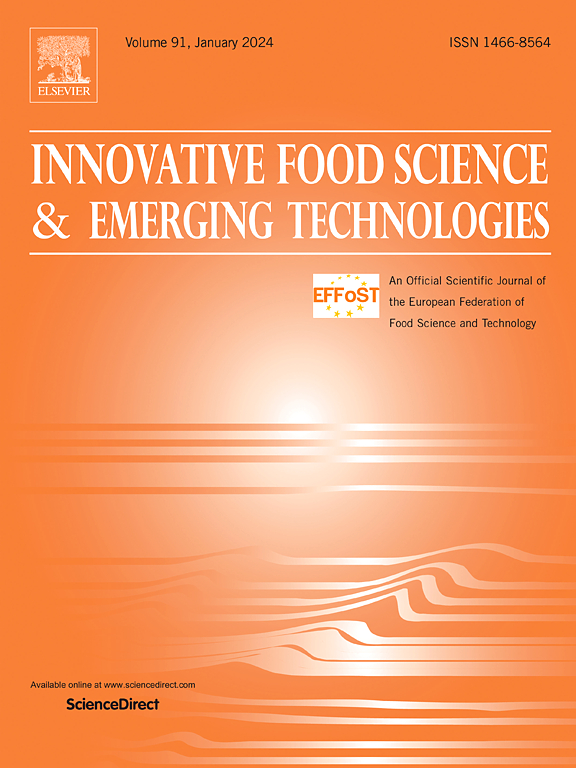Comparative evaluation of ohmic and conventional heat treatment on process time, microbial quality and bioactive retention of citrus beverages
IF 6.3
1区 农林科学
Q1 FOOD SCIENCE & TECHNOLOGY
Innovative Food Science & Emerging Technologies
Pub Date : 2025-04-29
DOI:10.1016/j.ifset.2025.104034
引用次数: 0
Abstract
Ohmic heating of sweet orange processed products (unsweetened juice, ready-to-serve (RTS) beverage, nectar, squash) was carried out with five different electric field strength ranging from 8 to 16 V/cm for comparing the impact of ohmic and conventional heating on their microbial load and physico-chemical properties. Pasteurization of products was achieved through ohmic heating (at 90 °C with holding time 1 min). Results indicated that electrical conductivity (EC) and high electric field intensity had positive effect on reduction of processing time of citrus beverages. EC reduced upon addition of sugar and dilution of juice in the products, hence no current flow was observed in RTS irrespective of voltage applied. In rest of the three products, more than 50 % reduction in microbial population was observed after processing at high voltage (210 and 240 V). Across the samples, ohmic process proved to be better for retention of total antioxidant activity, total phenolic content, flavonoids and ascorbic acid in comparison to conventional process. Energy consumption was high in squash and nectar due to low EC. Higher ohmic voltage given for pasteurization reduced the enzyme activity by 41.66 % in nectar. Shortened process time for ohmically treated citrus beverages resulted in least change of sensory attributes which were similar to control. Ohmic heating at high voltage treatment (more than 210 V) was best to reduce process time of citrus unsweetened juice. Overall product quality was more acceptable in ohmic treated sample as compared to conventionally heated ones.
欧姆和常规热处理对柑桔饮料加工时间、微生物品质和生物活性保持的比较评价
对甜橙加工产品(无糖果汁、即食饮料、花蜜、南瓜)在8 ~ 16 V/cm的5种不同电场强度下进行欧姆加热,比较欧姆加热和常规加热对其微生物负荷和理化性质的影响。产品的巴氏灭菌是通过欧姆加热(90°C,保温时间1分钟)实现的。结果表明,电导率和高电场强度对缩短柑桔饮料的加工时间有积极作用。在产品中加入糖和稀释果汁后,EC降低,因此无论施加何种电压,RTS中都没有观察到电流流动。其余三种产品在高压(210和240 V)下处理后,微生物数量减少了50%以上。在所有样品中,欧姆工艺被证明比传统工艺更能保留总抗氧化活性、总酚含量、类黄酮和抗坏血酸。由于能量消耗低,南瓜和花蜜的能量消耗高。巴氏灭菌时较高的欧姆电压使花蜜中的酶活性降低了41.66%。高温处理后的柑桔饮料加工时间缩短,其感官属性变化最小,与对照相似。高电压(大于210 V)下欧姆加热对缩短柑桔无糖果汁的加工时间效果最好。与传统加热样品相比,欧姆处理样品的整体产品质量更可接受。
本文章由计算机程序翻译,如有差异,请以英文原文为准。
求助全文
约1分钟内获得全文
求助全文
来源期刊
CiteScore
12.00
自引率
6.10%
发文量
259
审稿时长
25 days
期刊介绍:
Innovative Food Science and Emerging Technologies (IFSET) aims to provide the highest quality original contributions and few, mainly upon invitation, reviews on and highly innovative developments in food science and emerging food process technologies. The significance of the results either for the science community or for industrial R&D groups must be specified. Papers submitted must be of highest scientific quality and only those advancing current scientific knowledge and understanding or with technical relevance will be considered.

 求助内容:
求助内容: 应助结果提醒方式:
应助结果提醒方式:


